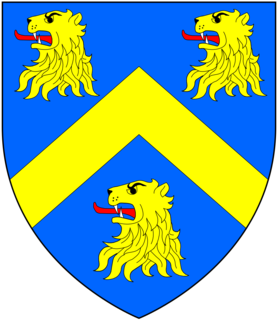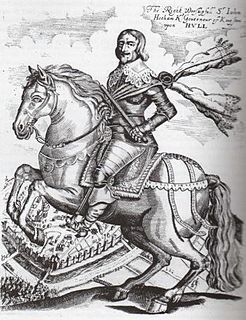This page is based on this
Wikipedia article Text is available under the
CC BY-SA 4.0 license; additional terms may apply.
Images, videos and audio are available under their respective licenses.

Duke of Westminster is a title in the Peerage of the United Kingdom. It was created by Queen Victoria in 1874 and bestowed upon Hugh Grosvenor, 3rd Marquess of Westminster. It is the most recent dukedom conferred on someone not related to the British royal family.

Earl of Lichfield is a title that has been created three times, twice in the Peerage of England and once in the Peerage of the United Kingdom (1831). The third creation is extant and is held by a member of the Anson family.
Baron Denham, of Weston Underwood in the County of Buckingham, is a title in the Peerage of the United Kingdom. It was created in 1937 for Sir George Bowyer, 1st Baronet, a Conservative politician who had earlier represented Buckingham in the House of Commons. He had already been created a baronet, of Weston Underwood, in 1933. Bowyer was a great-great-great-grandson of Sir William Bowyer, 3rd Baronet, of Denham Court. As of 2017 the titles are held by his second but only surviving son, the second Baron, who succeeded in 1948. In 1950 he also succeeded a distant relative in the Bowyer baronetcy of Denham Court. Like his father Lord Denham is a Conservative politician and one of the ninety elected hereditary peers that remain in the House of Lords after the passing of the House of Lords Act 1999.

Sir William Brereton, 1st Baronet was an English writer and politician who sat in the House of Commons at various times between 1628 and 1659. He was a commander in the Parliamentary army in the English Civil War.
Sir William Constable, 1st Baronet was an English soldier, politician and regicide, who supported the Parliamentary cause during the English Civil War and interregnum.
The post of Lord Lieutenant of the North Riding of Yorkshire was created in 1660, at the Restoration, and was abolished on 31 March 1974. From 1782 until 1974, all Lords Lieutenant were also Custos Rotulorum of the North Riding of Yorkshire.

Earl of Egremont was a title in the Peerage of Great Britain. It was created in 1749, along with the subsidiary title Baron of Cockermouth, in the County of Cumberland, for Algernon Seymour, 7th Duke of Somerset, with remainder to his nephews Sir Charles Wyndham, 4th Baronet, of Orchard Wyndham, and Percy Wyndham-O'Brien. The Duke had previously inherited the Percy estates, including the lands of Egremont in Cumberland, from his mother Lady Elizabeth Percy, daughter and heiress of Joceline Percy, 11th Earl of Northumberland. In 1750 Sir Charles Wyndham succeeded according to the special remainder as second Earl of Egremont on the death of his uncle. His younger brother Percy Wyndham-O'Brien was created Earl of Thomond in 1756.

The Sheriff is the oldest secular office under the Crown. Formerly the Sheriff was the principal law enforcement officer in the county but over the centuries most of the responsibilities associated with the post have been transferred elsewhere or are now defunct, so that its functions are now largely ceremonial.

The Fairfax, later Ramsay-Fairfax, later Cameron-Ramsay-Fairfax-Lucy Baronetcy, of The Holmes in the County of Roxburgh, is a title in the Baronetage of the United Kingdom. It was created on 14 March 1836 for Henry Fairfax, in honour of his father, Vice-Admiral Sir William George Fairfax. The second Baronet assumed the additional surname of Ramsay in 1876, which was the maiden name of his maternal grandmother. The third Baronet assumed by Royal Licence the additional surname of Lucy in 1892 after his marriage to Ada Christina Lucy, daughter and heiress of Henry Spencer Lucy. In 1921 he added by Royal licence the additional surname of Cameron, making this quadruple-barrelled name a notable example of the British tradition of concatenated surnames.
Events from the year 1645 in England.

Nun Appleton Priory was a priory near Appleton Roebuck, North Yorkshire, England. It was founded as a nunnery c. 1150, by Eustace de Merch and his wife. It was dissolved by 1539, when the nuns were receiving pensions.
Sir William Savile, 3rd Baronet of Thornhill was an English politician who sat in the House of Commons between 1640 and 1642. He fought on the Royalist side in the English Civil War and was killed in action.

Fairfax House is a Georgian townhouse located at No. 27, Castlegate, York, England, near Clifford's Tower and York Castle Museum. It was probably built in the early 1740s for a local merchant and in 1759 it was purchased by Charles Gregory Fairfax, 9th Viscount Fairfax of Emley, who arranged for the interior to be remodelled by John Carr (architect). After the Viscount's death in 1772, the house was sold and subsequently passed through a number of local families before spending some time as a Gentleman's Club, a Building Society and a cinema. The property was bought by York Civic Trust in the 1980s and completely restored to its former grandeur. Fairfax House is now a museum open to the public and a Grade I listed building.
Sir Robert Markham, 2nd Baronet was an English politician who sat in the House of Commons from 1678 to 1685.
Charles Fairfax, 5th Viscount Fairfax of Emley, was an English peer.









